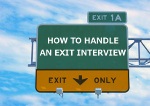How to Handle an Exit Interview
 When you leave a job, it is typical that you will have an interview set up by the human resources department upon your exit. It is important to know how to handle an exit interview appropriately and tactfully depending on the situation to further advance your career and move on to the next step in your professional life.
When you leave a job, it is typical that you will have an interview set up by the human resources department upon your exit. It is important to know how to handle an exit interview appropriately and tactfully depending on the situation to further advance your career and move on to the next step in your professional life.
The reason that HR representatives request that you participate in an exit interview is that they are interested in determining why it is you are leaving. The management may use some of your information to improve the company.
How to Ace an Exit Interview
Some people leave their jobs because they are unhappy with their workplace, and it can be very tempting to give HR an earful during this time. However, you must stop and think about what the best course of action is. The right thing to do can vary quite a bit.Sometimes you should be brutally honest and explain what compelled you to leave. Other times you must grin and bear it as the short-term satisfaction of telling them how you feel will have negative long-term consequences. Don't spout off to fulfill your emotional needs. You are probably better off making up some excuse that is reasonable rather than complaining about your dissatisfaction. Suck it up and move on, you can flourish in your next job.
Career Help Center
How to Prevail at an Exit Interview
So what direction should you proceed with your interview? Should you give the employer a piece of your mind, or be very polite and not have very much to contribute? Try asking yourself the following questions to determine what is best for you:How to Proceed
- Why have you decided to leave?
What is the true reason for your resignation? Is the reason you don't get along with your coworkers or boss? Is it a hostile work environment? Are you underpaid, not being challenged enough, or not respected in your company?
Some of these previously listed questions are serious and legitimate justifications for you to quit a job. Do you truly believe that you could help someone else in the future by bringing some of these issues into focus? Then perhaps you should think about bringing them to light. - Do you want anyone there to be a reference or future connection?
You have spent time at your workplace and have no doubt made some connections during your time of employment. Keep in mind that because that company will no longer employ you does not mean that they are no longer of any use to you.
Determine the level of credibility your employer holds in your field, will you need them for a reference in the future? That can tell you if you should try not to burn any bridges, and therefore not speak up about any concerns in the workplace.
Most of the time, the latter choice will be correct. The concerns that you once felt were important will not seem to matter anymore since you will no longer be working. Sometimes it is better to let things go and move on in life.
Handle It with Class and Professionalism
- Prepare Yourself
When you sit down with the HR representative, they will ask you explicitly specific questions about your job, and the time you spent there. If you are overly emotional about your situation, you may give vehement replies. Mitigate this by preparing yourself mentally and even practice what you will say, even if it is untrue.
Compile a list of reasons why you have decided to leave. Although they may not necessarily be true note your feelings about your coworkers, managers, and the positives of the job. Edit the list down to an appropriate number of reasons that you can explain easily. - Be As Honest As Necessary
It would be best if you kept in mind that your previous manager may review your responses so refrain from saying anything too honest about the company. They expect you to be honest, but that doesn't mean you must include every detail in your response. - Keep It Professional
Your professional behavior is the most important aspect of your interview. Much of how you maintain a professional atmosphere has to do with how well you control your emotions. This meeting is not a time to start crying about your awful experiences, or bad-mouthing your colleagues.
End your experience with the company on a positive note by only mentioning the good things that you associate with the company. Point out what goes right in the company and how they have helped you to succeed and advance your personal career.